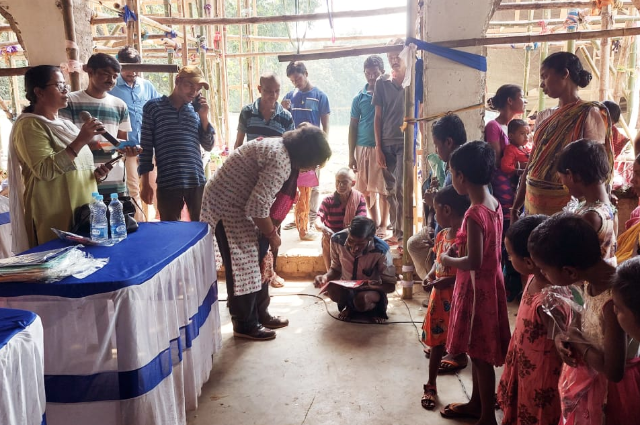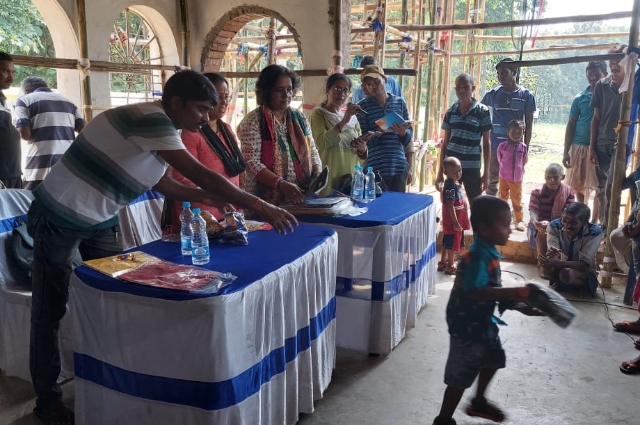
An interactive educational session on Environmental Issues was organized by a local NGO, Howrah Suparna at Ramrajatola, Howrah district, entitled: "Protecting Our Planet: An Interactive Session on Environmental Issues" to celebrate the World Environment Day on June 5, 2024. The audience included students from local schools and general public. The welcome address and overview of the session's goals as well as brief introduction of the facilitators and the importance of environmental awareness was delivered by the General Secretary, Prof (Dr.) Suparna Sanyal Mukherjee. As an Icebreaker Activity, a quick poll or question: "What is the most pressing environmental issue to you?" The active audience shared a few responses to set the tone. Saikat Kumar Basu made a presentation on key environmental Issues entitled: 'Global Warming and Climate Change'.
The staff members of Howrah Suparna then initiated a series of interactive sessions with the participating audience as:
- Causes and effects of Climate Change with real-world examples (e.g., melting ice caps, extreme weather).
- Pollution Types (air, water, soil, noise), Health impacts and statistics.
- Deforestation and Loss of Biodiversity- Causes and consequences highlighting the importance of forests and species diversity.
- Waste Management with respect to plastic pollution: Recycling and sustainable practices.

The interactive discussion was followed by engaging the audience in the Community Mapping Activity. The audience was next divided into small groups. Each group identified important local environmental problems and shared their collective findings with the entire group facilitating discussions among them. Discussion on common themes from the mapping activity was encouraged to share personal experiences and observations of the audience. A Hands-On Activity on Environmental Solutions on Creating Eco-Friendly Products. The staff demonstrated how to make environment-friendly cleaning products, reusable bags, or planters from recycled materials. The staff provided materials and guide participants in making their own. Several interactive stations was set up to promote activities like composting, upcycling old items, and energy-saving tips. Local environmental experts and activists invited to the program shared their brief talk on their work and insights. An open floor for questions from participants was encouraged for the audience. Howrah Suparna staff guided participants to write down three actionable steps they can take to reduce their environmental impact. Participants signed a pledge wall committing to specific actions. A final recap of the session was conducted highlighting the key points and activities and by extending thanks to participants for their involvement and resource persons for providing their help to execute the program.
Handouts with tips, local recycling centers, environmental organizations, list of useful websites and environmental brochures and booklets for further reading was provided to the audience. Feedback was collected from the participants through a quick survey.
Announcements for upcoming events or ways to stay involved was mentioned.
Lastly, a networking and informal discussion was initiated for participants to mingle, discuss, and network with each other and the facilitators.
A structured yet flexible framework for an engaging and educational session on environmental issues, promoting both awareness and actionable solutions was thus achieved through this program conducted by Howrah Suparna.

A summary of some important environment-friendly practices suggested by the people participating in the program that can be incorporated into their daily lives is presented below:
1. Reduce, Reuse, Recycle
- Reduce: Minimize waste by buying products with less packaging, avoiding single-use plastics, and choosing durable goods.
- Reuse: Opt for reusable items like water bottles, shopping bags, and food containers.
- Recycle: Properly sort and dispose of recyclables like paper, glass, and certain plastics.
2. Conserve Water
- Shorter Showers: Limit shower time to save water.
- Fix Leaks: Repair dripping faucets and leaking toilets.
- Use Water-Efficient Fixtures: Install low-flow showerheads and faucets.
3. Save Energy
- Switch to LEDs: Use LED bulbs instead of incandescent ones.
- Unplug Devices: Unplug electronics when not in use to reduce phantom energy consumption.
- Energy-Efficient Appliances: Choose appliances with a high energy efficiency rating.
4. Sustainable Transportation
- Public Transport: Use buses, trains, or other public transportation options.
- Carpooling: Share rides with others to reduce the number of vehicles on the road.
- Cycling and Walking: Opt for biking or walking for short distances.
5. Eco-Friendly Eating Habits
- Plant-Based Diet: Incorporate more plant-based meals to reduce carbon footprint.
- Local and Seasonal Foods: Buy local produce to support local farmers and reduce transportation emissions.
- Reduce Food Waste: Plan meals, store food properly, and compost leftovers.
6. Green Home Practices
- Energy Audits: Conduct an energy audit to identify areas for improvement.
- Insulation: Properly insulate your home to reduce heating and cooling needs.
- Natural Cleaning Products: Use environmentally friendly cleaning products.
7. Conscious Consumption
- Sustainable Products: Choose products made from sustainable materials.
- Eco-Friendly Brands: Support companies with strong environmental policies.
- Minimalism: Practice minimalism by buying only what you need.
8. Gardening and Green Spaces
- Home Gardening: Grow your own vegetables, herbs, and plants.
- Native Plants: Use native plants in your garden to support local wildlife and reduce water usage.
- Community Involvement: Participate in community clean-up events and tree planting.
9. Educate and Advocate
- Stay Informed: Keep up-to-date with environmental issues and solutions.
- Spread Awareness: Share knowledge with friends, family, and your community.
- Advocate for Change: Support policies and initiatives that promote sustainability.
These practices can be introduced in your session through engaging activities, discussions, and demonstrations. Providing practical tips and examples will help participants understand how they can implement these changes in their daily lives.
